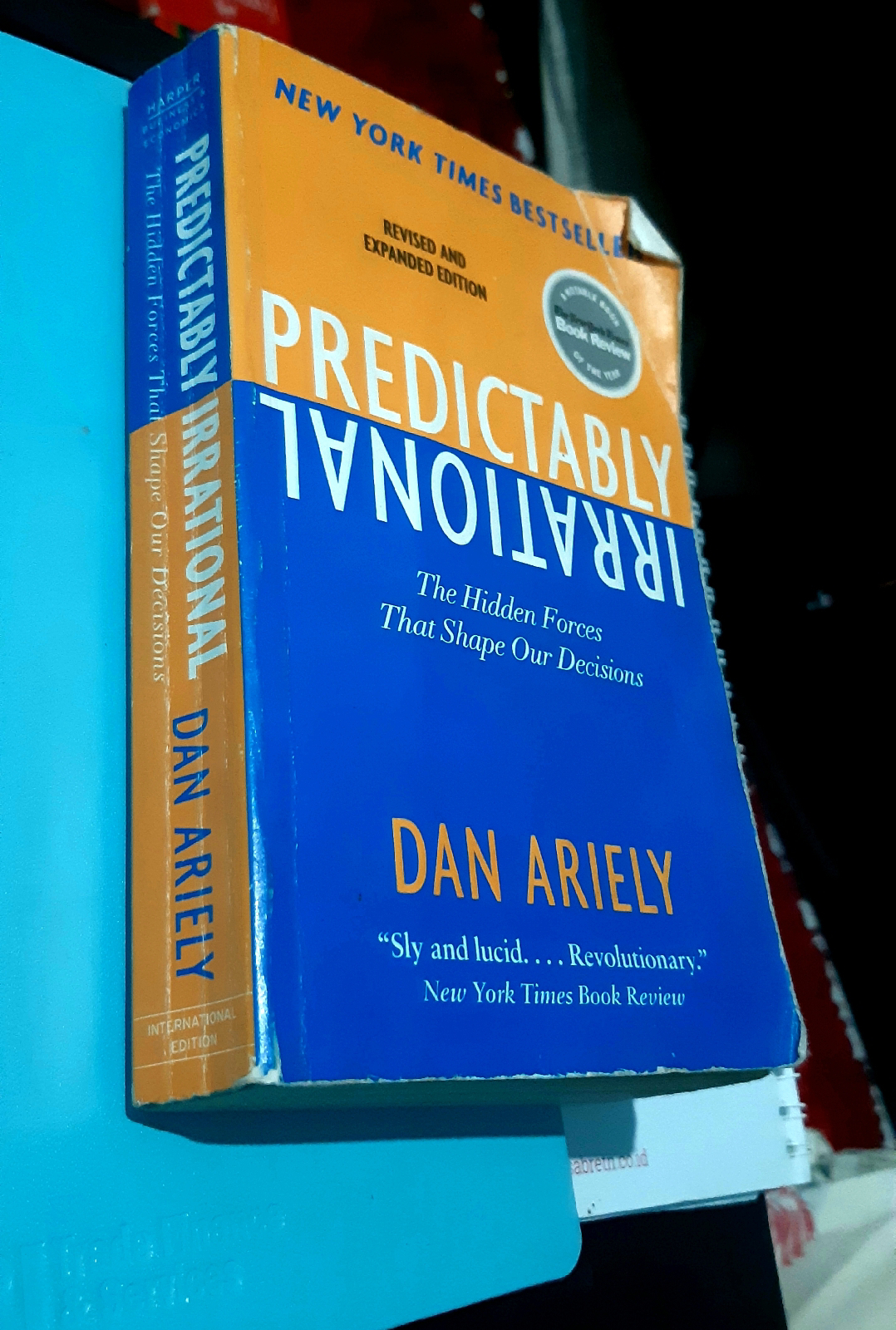Waw. Rasanya sudah lama sekali tidak membaca buku hingga selesai. Buku ini sepertinya adalah buku pertama non fiksi yang dibaca hingga selesai. Bukan karena buku ini tidak menarik, namun yah, karena penurunan minat membaca secara gila gilaan akhir akhir ini. :')
Dikarang oleh Dan Ariely, seorang profesor Psikologi dan Behavioral Economics di Universitas Duke, buku ini menceritakan lima belas fakta tentang irrasionalitas manusia dalam membuat keputusan ekonomi. Selain itu, Profesor Ariely juga mendebat teori ekonomi klasik tentang pembentukan harga pasar.
Buku ini bagi saya sangat menarik, meskipun sebenarnya adalah sekumpulan jurnal ilmiah. Fakta-fakta yang dibahas menarik, bahasa jelas dan sederhana dan sistematika penulisan membuat buku ini tidak membosankan dibaca.
Setiap teori dan fakta dijelaskan melalui eksperimen-eksperimen yang telah dilakukan oleh Prof Ariely sendiri. Selayaknya jurnal, metodologi buku ini diawali dengan latar belakang dan pertanyaan-pertanyaan skeptis tentang perilaku manusia yang katakanlah aneh. Kemudian dilanjutkan dengan hipotesis, akankah begini dan begitu. Selanjutnya berangkat dari premis dan hipotesis tersebut, Prof Ariely menjelaskan metodologi eksperimen yang telah dilakukan olehnya berserta kolega-koleganya. Dari hasil eksperimen tersebut profesor menjelaskan hasil dan rasionalisasi atas hasil tersebut.
Buku ini cocok sekali buat yang ingin
mengembangkan critical thinking. Berangkat dari satu masalah, Prof Ariely tidak hanya berhenti di satu titik. Pertanyaan-pentanyaan skeptis yang mendasari dikembangkan kembali. Begitu pun model eksperimen yg dilakukan. Setuju sih dengan review yang diberikan pada buku ini dan tidak heran juga kalau masuk di serial New York Times Bestsellers.
Di akhir, Dan Ariely menekankan bahwa manusia itu bias dan tidak ada yang bisa dilakukan selain menerimanya. Setelah penerimaan tersebut, kita selayaknya lebih mendengarkan nasehat dan feedback dari orang lain serta melakukan sesuatu untuk memperbaiki proses pembuatan keputusan yang dipengaruhi oleh kebiasan tersebut.
Berikut saya share beberapa fakta menarik menurut saya yang dibahas pada buku ini :
1. Seorang manusia tidak dapat mendefinisikan apa yang mereka inginkan sebelum memiliki pengetahuan tentang hal tersebut. Karena itu lah manusia cenderung mengambil keputusan dengan cara membandingkan satu hal dengan hal yang lain. Masalahnya adalah apakah hal yang dibandingkan sudah sesuai, sedangkan manusia cenderung membandingkan dengan hal hal yang berada dekatnya atau yang pernah dialami. Problem ini sejalan dengan teori yang dikemukakan oleh buku Thinking Fast and Slow karya Daniel Kahnemann tentang Sistem 1 manusia yang bersifat intuitif dan cenderung mempermudah dan menyederhanakan masalah.
2. Terdapat dua norma di masyarakat dalam memandang materi yaitu norma pasar dan norma sosial. Kedua norma tersebut tidak dapat berjalan beriringan. Teori yang dikemukakan adalah bahwa jika barang barang yang biasa memiliki nilai pasar (bisa diperjualbelikan) digratiskan, maka manusia akan lebih memperhatikan sesama. Teori ini menjelaskan kenapa saat makan bersama selalu ada sedikit sisa makanan. Dan sebaliknya jika barang yang biasa dinilai dengan nilai sosial kemudian diukur dengan nilai pasar/uang maka kepuasa atas barang tersebut akan hilang.
3. Manusia cenderung membuka opsi seluas luasnya karena takut akan kehilangan kesempatan. Padahal semakin banyak opsi yang diambil semakin tinggi risiko bahwa tujuan tidak tercapai secara optimal.
4. Ekspektasi terhadap suatu hal/barang secara tidak sadar akan mempengaruhi hasil/tingkat kepuasan marginal atas utilisasi barang/jasa tersebut.



















